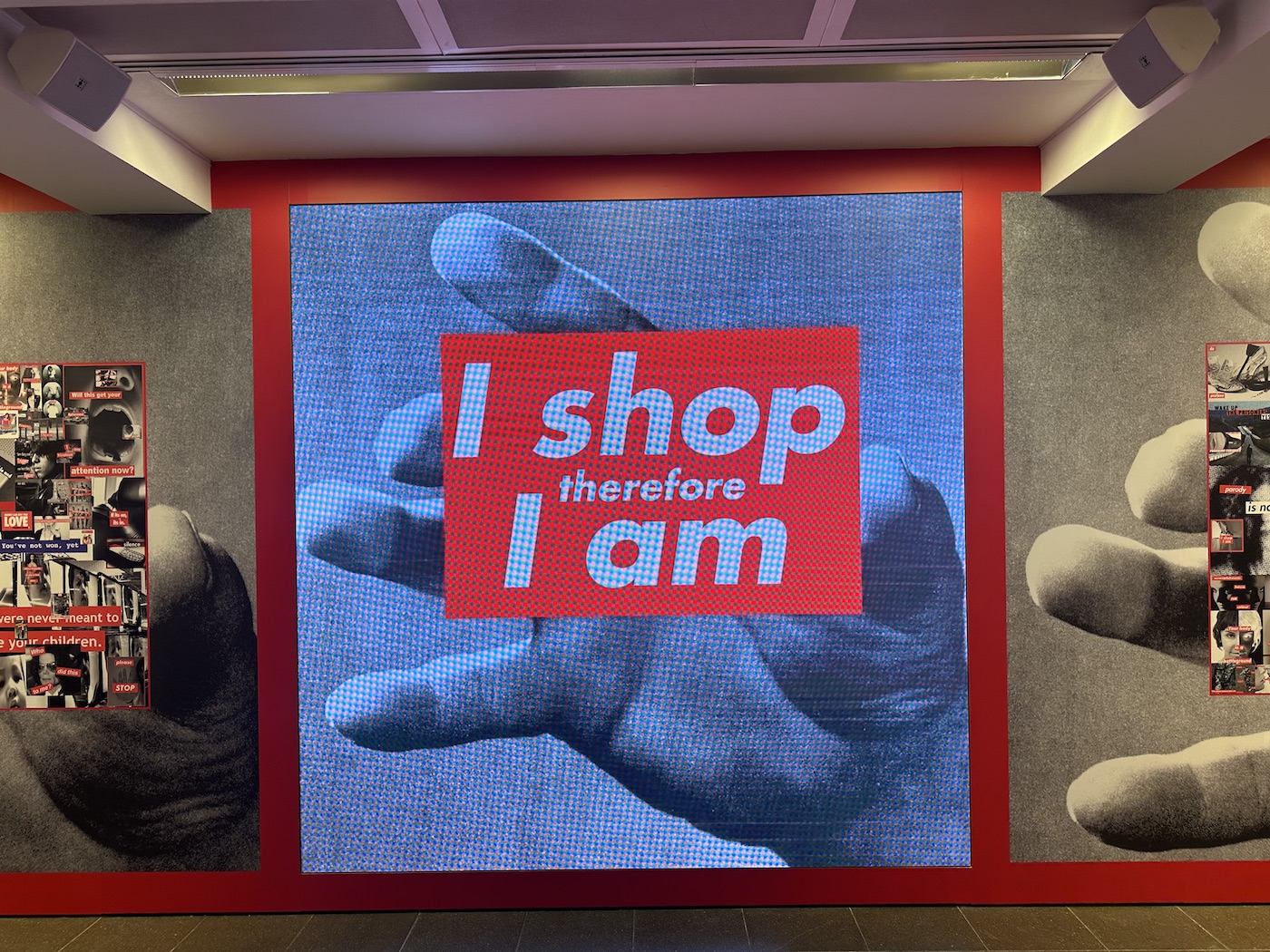‘The past’, wrote L.P. Hartley in his 1953 novel The Go-Between, ‘is a foreign country: they do things differently there.’ Revisiting Barbara Kruger’s work in the 21st century, I’m struck by how much it encapsulates the tone of its times that, seen in retrospect, seem so committed and fervent compared to the dystopian ennui that we are living through today.
Born in Newark, New Jersey, in 1945, Kruger was part of the wave of assertive political feminist artists that included Cindy Sherman, Martha Rosler and Jenny Holzer, a reaction against the conformity of their mother’s generation, the sort of women baking cookies in the suburbs encountered in American novelist Richard Yates’ Revolutionary Road. Everything in these artists’ lives was a fit subject for protest, deconstruction and analysis. How women should interact with traditional societal norms was a source of continuous debate. Nothing was taboo: menstruation, childcare, orgasms, class and racial solidarity. In 1987 that shopkeeper of conservatism, Margaret Thatcher, claimed in an interview with Woman’s Own that there was ‘no such thing as society’. On the contrary, this was a generation of feminist artists for whom the ‘personal was political’. Everything reflected some aspect of society.
Kruger’s work is big and bold, direct and to the point. There are no namby-pamby ‘trigger warnings’ or safe zones here. She tells it how it is. Combining found photographs with bold text in her signature colour scheme of black, white, and red (revolutionary colours), she overlays these images with provocative phrases that explore how ideological messages infiltrate daily life through the mass media. This was, no doubt, influenced by the media guru of the day, Marshall McLuhan, a Canadian academic who coined the phrase ‘the medium is the message’. For McLuhan this meant that the medium in which messages were sent significantly impacted society. This became a point of departure for artists such as Kruger whose work melds words and image, borrowing from the blatant language of advertising, magazines and graphic design.
The phrase ‘I shop therefore I am’ playfully and ironically twists René Descartes’ famous philosophical proposition ‘I think, therefore I am’. While Descartes emphasised thought as proof of our existence, Kruger associates that proof with consumer behaviour. It is as if capitalism offers consumers – particularly women – shopping in place of thinking. The implication is that shopping can dull the mind in a similar way to soma, that recreational drug in Aldous Huxley’s Brave New World used to raise ‘a quite impenetrable wall between the actual universe and their minds’. Soma was a ‘happy’ drug: ‘the loving cup of strawberry ice-cream soma was passed from hand to hand, whilst uttering the mantra, ‘‘I will drink to my annihilation…’. Its primary purpose was unadulterated pleasure that made those who drank it avoid reality so that their vacant minds could be controlled. The inference in Kruger’s work is that the endless consumer culture of late capitalism does exactly the same. Mindless shopping and material acquisition stand in the place of individual thinking and impair the road to self-hood.
The video of ‘I shop therefore I am’ begins with the central image shattered into a disarray of puzzle pieces, which are then reassembled. Once complete, we are confronted with variations on the theme: ‘I shop therefore I hoard/’I need therefore I shop’/’I love therefore I need’/’I am therefore I hate’/’I sext therefore I am’/’I died therefore I was.’ Each aphorism implies that capitalism and the acquisition of goods essential to its maintenance is a form of soma that prevents the population engaging with political or philosophical debates. Shopping malls become the new cathedrals, whilst the goods purchased feed the addiction that whispers – buy, buy, buy. The language of advertising becomes the new 20th shibboleth replacing that of religion. Joy and self-hood are now achieved by the purchase of the latest fashion or electronic item.
Kruger’s art transcends traditional boundaries, appearing not only in galleries but also on everyday items like shopping bags and T-shirts.. It challenges materialism and invites us to reconsider our relationship with mass consumption ‘ I shop therefore I am’ exemplifies the shift from modernism to postmodernism, where barriers between high art and popular culture are removed and, with a nod to Walter Benjamin, take on a mechanically reproduced form, an aesthetic dependent on the media of mass-distribution.
Her work put centre stage that of women marginalised, at the time, by the dominant patriarchy, Taking commodities from the consumer world, she presents them both as pastiche and the new normal. Previously religion had attempted to make sense of our world through objects and ritual. Still, in a society where the death of God is ubiquitous, ‘I shop therefore I am’ provides a mantra for the lost souls of the 20th century. Kruger takes the tropes of consumerism and replaces philosophy and religious ritual with the eclectic sacrament of shopping and the endlessly new. Therefore, a search for meaning and self-hood is not to be found in the great cathedrals of Chartres or Canterbury but in the shopping malls of our new ticky-tacky towns. And art itself becomes subject to this encompassing consumerism. The greater the price of an artwork, the ‘greater’ its creative value. Art is no longer defined by its sublimity or metaphysics, but by its price tag, and as McLuhan foresaw, the ‘medium becomes the message’.
Kruger’s visual style has influenced countless graphic designers, making her a powerful force in contemporary art and cultural critique.
Words: Sue Hubbard Top Photo: P C Robinson Image © Artlyst 2024
Barbara Kruger: Silent Writings Offsite Every Monday, 4 March – 22 April 2024, 6 – 9pmFREE
Sue Hubbard is an award-winning poet, novelist and freelance critic. Her fourth novel, Flatlands, just out from Pushkin Press, can be bought here: Flatlands by Sue Hubbard | 9781911590743 | Pushkin Press and her latest poetry collection, God’s Little Artist: poems on the life of Gwen John.

